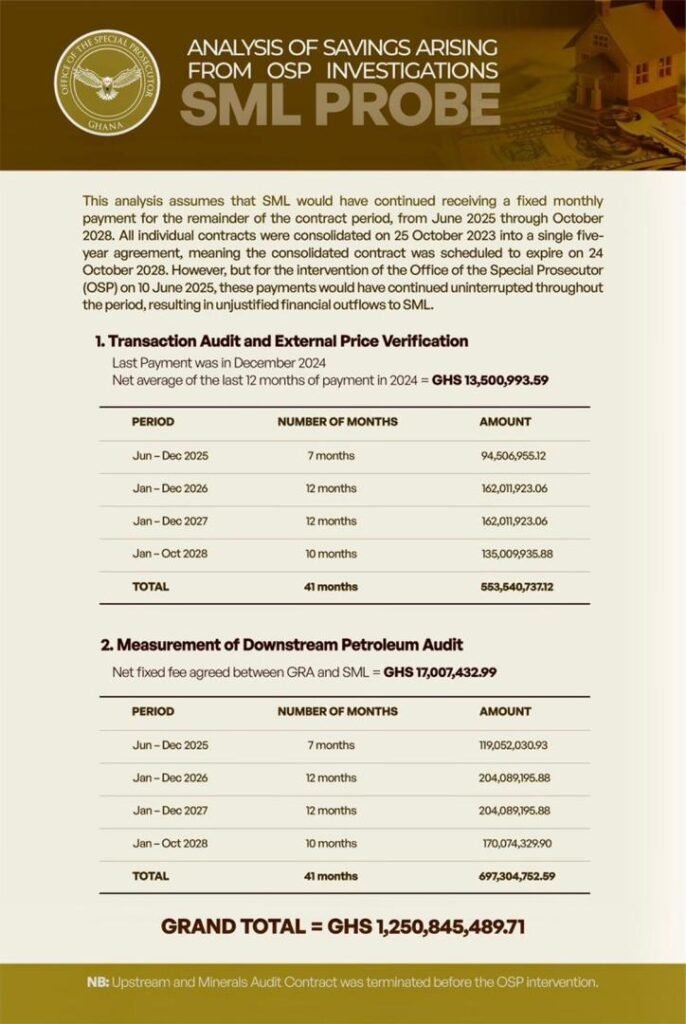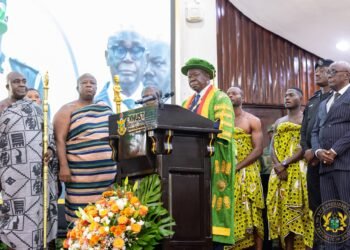The Office of the Special Prosecutor (OSP) has announced that its intervention in the controversial Strategic Mobilization Ghana Limited (SML) contracts has saved the Republic an estimated GH¢1.25 billion in potential unjustified payments.
The revelation underscores the OSP’s growing role not only in prosecuting corruption-related offenses but also in preventing the unlawful dissipation of public funds.
According to findings from the OSP, the intervention on June 10, 2025, halted what could have been years of continuous and unjustified outflows under irregular contractual arrangements between the government and SML.
The office explained that, without its timely action, these payments would have persisted until October 2028, further burdening Ghana’s already stretched public finances.
The statement described the outcome as one of the clearest demonstrations yet of how proactive investigations can protect national resources before they are lost.
“Accountability is not just about prosecution. It is also about prevention,” the OSP stated. This declaration encapsulates the office’s evolving approach to its constitutional mandate—balancing its prosecutorial powers with preventive interventions aimed at safeguarding the public purse.

The SML contracts, which spanned the downstream petroleum, upstream petroleum, and mining sectors, had been structured in a way that guaranteed the company substantial fixed revenues for supposed monitoring services.
However, investigations by the OSP and earlier media exposés raised questions about the legitimacy, transparency, and value-for-money justification of these agreements.
The contracts were initially estimated to cost the state more than $500 million (approximately GH¢5 billion) over five years, with an option to renew for an additional five.
SML’s Services Overlapped with Functions
According to the OSP’s findings, SML’s services overlapped with functions already being performed by existing state institutions such as the Ghana Revenue Authority (GRA) and the National Petroleum Authority (NPA).
The arrangement, the OSP noted, represented a duplication of roles that offered little measurable value to the state while committing the government to significant recurring financial obligations.
The OSP’s intervention came amid growing public pressure following widespread revelations about the SML deal’s questionable basis. Civil society groups, investigative journalists, and policy analysts had called for the contract’s cancellation, describing it as an abuse of public procurement processes and a violation of basic financial prudence.

The investigation confirmed that the contracts had been executed without adherence to standard procurement procedures and lacked any independent verification of the purported technological solutions SML was contracted to provide.
More importantly, the OSP’s analysis revealed that SML’s revenue-sharing model was designed in a manner that would have continuously drained the national treasury with minimal accountability.
In explaining the broader significance of the intervention, the OSP emphasized that stopping such payments before they occur is as vital as prosecuting those involved after the fact.
The financial implications of the OSP’s action are substantial. The GH¢1.25 billion saved represents funds that can now be reallocated to priority sectors such as education, healthcare, and infrastructure.
Analysts have described the outcome as a critical win for Ghana’s anti-corruption architecture, illustrating how institutional vigilance can produce tangible fiscal benefits.
The OSP’s announcement comes shortly after President John Dramani Mahama’s directive ordering the cancellation of all SML contracts following the OSP’s final report.
The President’s decision, conveyed through a letter signed by the Secretary to the President, Dr. Callistus Mahama, instructed the Minister of Finance, Dr. Cassiel Ato Forson, to terminate all existing SML agreements across the petroleum and mining sectors.
The cancellation was celebrated by transparency advocates and investigative journalists, including Manasseh Azure Awuni, whose exposé initially brought public attention to the issue.
He described the OSP’s work as a big win for the country and an example of how collaboration between independent institutions and the media can produce meaningful accountability outcomes.

Analysts have also pointed out that the OSP’s preventive approach is essential to rebuilding public confidence in Ghana’s governance systems. For years, corruption-related investigations have often resulted in delayed prosecutions or stalled court processes, leading to perceptions of impunity.
The OSP’s recent emphasis on preemptive financial protection represents a shift toward a more efficient and results-oriented anti-corruption strategy.
As the OSP continues its broader investigations into procurement irregularities, it has reiterated its commitment to remain independent, transparent, and firm in upholding the principles of accountability.
READ ALSO: Petroleum Commission Engages Singapore to Boost Upstream Petroleum Sector























